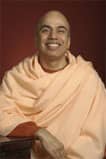The practice of brahmacharya, "dwelling in Brahman," involves moving away from the body/mind complex, which is the false self, and affirming the true Self, the "real me." What makes the "moving away" process difficult is the strong claim that the body and the mind exert over me, the constant demands that they make of me. Hunger and thirst, rest and work, joy and sorrow, ambition and frustration, likes and dislikes -- who has been free from the demands and pressures of these? The body and mind make their presence felt through all of these and more. But the intensity of sexual desire is often more powerful and more persistent than that of our other needs, so the meaning of brahmacharya often gets narrowed down to sexual abstinence.
Sexuality plays an important part in human life and it often absorbs much of our thinking, feeling, and willing. In Hinduism it is customary to view most things at three levels: physical, mental, and verbal. Brahmacharya, or celibacy, includes sexual abstinence at all these levels. Celibacy thus is not limited to merely physical abstinence from sexual activity but also includes non-indulgence in sexual fantasy and sexual talk. Body, mind, and speech are interconnected and they tend to influence one another. When these three become compartmentalized and disconnected, the result is disharmony, which often leads to mental stress and anxiety, physical illness, and unhealthy interpersonal relations.
The Hindu tradition believes that the ideal of brahmacharya is relevant to all, but its "application" to monastic life is different from its application to married life. Marriage is not a license to do away with all restraints. Chastity and fidelity are the foundation on which a strong and happy marital relationship can be built. In a world full of temptations, if a married person can fulfill these duties, he or she can get the same benefits that a monastic does through a sincere practice of celibacy.
Since brahmacharya is about self-restraint, it doesn't really matter to whom one feels sexually attracted or with whom one has a committed long-term relationship. Sex is sex, whether heterosexual or homosexual. For spiritual seekers of every persuasion, the ideal is still brahmacharya. This ideal is not about sex per se. It means "dwelling in Brahman," or dwelling in the experience of our identity as Being, Consciousness, Bliss Absolute.
The troubled times in which we live today may lead us to imagine that the brahmacharya ideal is unattainable. But there are, in every generation, people who have lived up to this ideal, and that gives hope to the rest of us. Furthermore, the ideal of brahmacharya, although relevant for all, is not mandatory for all. Not everyone feels the call to practice brahmacharya, and those who do, have options and a graded system of employing it in their own lives. For those who choose monastic life, the rules are most stringent and uncompromising, given the difference in the vocation of those called to monasticism. In marriage, the emphasis is on fidelity -- remaining faithful to one's spouse. Indeed, the glory of chastity in married life and the spiritual power it can generate have been described in great detail in Hindu history as well as in mythology.
The benefits of celibacy are many. It cultivates spiritual intuition, a strong memory, and a remarkable capacity to grasp the subtle realities of life. The faithful attest that the lack of it results in loss of mental vigor and moral strength. Furthermore, for a sustained practice of contemplation our brain needs to be strong and calm -- and this becomes possible through brahmacharya because it provides nourishment and vigor to the brain. The validity of these claims is borne out by the actual experience of people who have practiced brahmacharya.
It is needless to say that the ideal of celibacy, like any other ideal, has its own challenges and pitfalls. These challenges have to be faced head-on and the pitfalls have to be avoided. This has to be done by both individuals as well as institutions. Among the things important to foster if one intends to keep the ideal of celibacy are strong motivation, spiritual longing, the practice of detachment and self-restraint, and the direction of one's energies in higher creative pursuits. Celibacy is a lofty ideal, and it is a rewarding experience to know how this ideal is defined and practiced in faith traditions other than one's own. Why? We have much to learn from one another. The more we do that, the better our understanding will be of the ideals that we hold dear in our own lives.
This article was first published at The Journal of Inter-Religious Dialogue and is reprinted with permission.
 Swami Tyagananda is a Hindu monk (sannyasi) of the Ramakrishna Order and presently head of the Order's branch in Boston. He became a monk 28 years ago, soon after graduating from the University of Bombay, India. He was assigned to the Vedanta Society in Boston in 1998. He serves as the Hindu chaplain at Harvard University.
Swami Tyagananda is a Hindu monk (sannyasi) of the Ramakrishna Order and presently head of the Order's branch in Boston. He became a monk 28 years ago, soon after graduating from the University of Bombay, India. He was assigned to the Vedanta Society in Boston in 1998. He serves as the Hindu chaplain at Harvard University.




